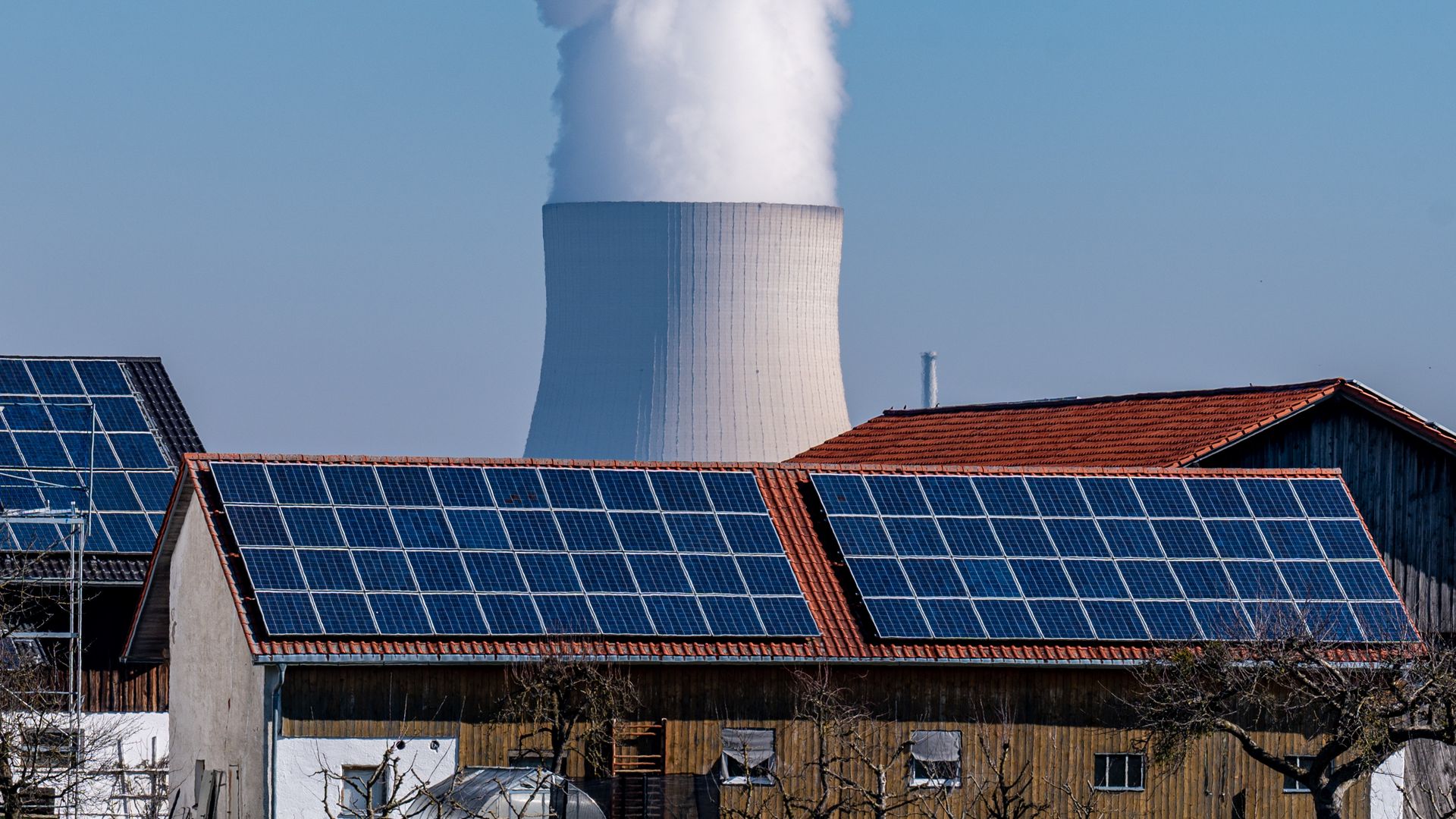| |
| |
| |
| |
| |
| Axios Generate |
| By Ben Geman and Andrew Freedman ·Mar 21, 2022 |
| ☕ Good morning. Today's Smart Brevity count is 1,295 words, 5 minutes. 🚀 Launching today: the Axios Pro Climate Deals newsletter. Sign up here. #️⃣ Number of the day: 600. The consecutive hours some crew at the Chernobyl Nuclear Power Plant had to work before being relieved on Sunday. |
| |
| |
| 1 big thing: Why this gas price surge may be different |
 |
|
| Illustration: Brendan Lynch/Axios |
| |
| High gasoline prices are making Americans mad — but probably not mad enough to greatly accelerate the shift away from gas-guzzling cars, Ben writes. Why it matters: Transportation is the largest source of U.S. carbon emissions. Driving the news: Regular gasoline averaged $4.26 per gallon Sunday, per AAA, down about 7 cents from a week earlier, but still roughly $1.40 higher than a year ago. The big picture: Gas prices have spiked before, and while those jumps have changed consumers' choices at the margins, pain at the pump hasn't reversed the long-term growth in the popularity of pickups and SUVs. Between the lines: Even if this surge in gas prices does make more Americans seriously interested in insulating themselves from the next one, it's not so easy. - Automakers have discontinued numerous smaller vehicles in recent years after consumers abandoned them, Axios' Nathan Bomey reports.
- And the Ukraine crisis, in addition to driving up oil prices, is also driving up battery input costs — notably nickel — for electric vehicles. Inventory is tight, too, CNBC reports.
Yes, but: This time could be different. We're in uncharted waters. The last time gasoline prices were this high, electric cars were barely a blip in the market. - Now sales are growing fast, climbing to about 4.5% of the U.S. new car sales last year, and automakers are bringing a lot of new vehicles to market.
- The new choices feature a number of electric SUVs and pickups, vehicle types at the heart of the U.S. consumer market.
- Edmunds reports shopper interest on their site in battery vehicles, plug-in hybrids and traditional hybrids saw a weekly rise of 39% in the week ending March 13 and was 84% higher than in mid-February.
What we're watching: The duration of these high gasoline prices will play a big role in determining how much they change consumers' behavior. - Oil prices — by far the biggest driver of retail fuel costs — are in an exceptionally volatile and unpredictable place.
- "It's safe to say that persistently high gasoline prices will have a bigger effect on EV demand than fleeting increases would," University of California-Davis economist David Rapson tells Axios.
Zoom in: Rapson is co-author of a new working paper that finds California drivers' vehicle choices in 2014-2017 were far more responsive to changes in gasoline prices than electricity prices. - "Although we'd be speculating if we were to forecast from the gasoline prices in our study to today's super-high gasoline prices, our results suggest that there will be a lot more people out shopping for EVs because of high gas prices," authors said in a new blog post on the analysis.
|
    |
| |
| |
| Bonus: the limited historical effect of price swings |
 Data: Department of Energy; Chart: Baidi Wang/Axios Gasoline price swings affect miles traveled, but the changes are not huge. |
    |
| |
| |
| 2. Here come U.S. carbon disclosure mandates |
 |
|
| Illustration: Brendan Lynch/Axios |
| |
| The U.S. is poised to take a big step toward requiring that publicly traded companies disclose their climate risk exposure, through the issuance of proposed rules from the Securities and Exchange Commission, Andrew writes. Driving the news: This proposed rule, to be taken up at an SEC meeting this morning, has been under discussion since last year. It aims to some clarity for investors to allow them to determine the climate risks lurking in their portfolio. The big picture: In proposing climate risk disclosure rules, the SEC will effectively be trying to set a floor for companies to meet or exceed when reporting how prepared they are for global warming's consequences. - SEC chairman Gary Gensler has said he favors disclosure rules that educate investors about the climate change-related risks embedded in their investments.
The intrigue: Climate activists are hoping the rules will impose reporting requirements on all types of emissions, including Scope 3 emissions that come from the use of a firm's products. - However, given that relatively few companies even account for Scope 3 emissions in their emissions targets, it's possible that any provision in this area would either be voluntary or phased in over time.
- In crafting the new rule, the SEC has had to grapple with the near certainty that it will be challenged in court, which could result in a more cautious approach.
What they're saying: "The SEC, its job is to protect investors and make sure capital markets are operating efficiently," Daniel Firger, managing director of Great Circle Capital Advisors, told Axios. "[Climate] is now one of many risks that investors need to know about." Read more. |
    |
| |
| |
| A message from Chevron |
| The fuels of the future can come from anywhere |
| |
 |
| |
| Chevron is exploring unexpected sources of energy to help create a lower carbon future. We're working with partners in California to convert the methane from cow waste into renewable natural gas that, one day, can help fuel trucks across the nation. Because it's only human to keep innovating. |
| |
| |
| 3. UN leader warns on Ukraine war and climate goals |
 |
|
| Steam rises from the cooling tower of the Isar 2 nuclear power plant on March 3. Photo: Armin Weigel via Getty Images |
| |
| In a major speech this morning, United Nations Secretary-General António Guterres warned that Russia's unprovoked invasion of Ukraine could set back the climate agenda and spark a global food crisis, Andrew writes. Driving the news: Ukraine and Russia are major suppliers of wheat, and food prices are rising around the world as supplies are cut off. What they're saying: "As major economies pursue an 'all-of-the-above' strategy to replace Russian fossil fuels, short-term measures might create long-term fossil fuel dependence and close the window to 1.5 degrees," Guterres said. - "Countries could become so consumed by the immediate fossil fuel supply gap that they neglect or knee-cap policies to cut fossil fuel use."
- "This is madness."
By the numbers: The planet has already warmed by about 1.1°C above preindustrial levels, and the latest research shows the 1.5°C threshold could be breached between 2030-2035 based on emissions trends. |
    |
| |
| |
| 4. Go deeper: corporate climate pledges |
 |
|
| Illustration: Gabriella Turrisi/Axios |
| |
| Axios' Climate Truths Deep Dive series launched over the weekend with a look at corporate action — and inaction. |
    |
| |
| |
| 5. Carbon removal's place in the climate fight |
 |
|
| Illustration: Shoshana Gordon/Axios |
| |
| Iron Man — err, actor Robert Downey Jr., who's an investor in climate-related startups — stirred up debate when he tweeted that "the technologies that suck carbon out of the air and capture it are JUST AS IMPORTANT to stop global warming as building new renewable energy," Axios Kia Kokalitcheva reports. Why it matters: To climate tech investors (and scientists), the topic is more nuanced, with the debate focused on the optimal scale and prioritization of carbon removal and capture as a tool to fight climate change. The big picture: Venture capital and other investments in climate tech and energy companies have skyrocketed over the past few years. Yes, but: Texas A&M University climate scientist Andrew Dessler pushed back on Downey, tweeting that renewables and stopping emissions overall are the top priority. - His comments echo the views of many scientists that curbing global warming requires, first and foremost, a vastly faster shift to clean energy sources like renewables, efficiency tech, electric vehicles, and others.
- Carbon removal can be a complement to vastly expanding clean energy tech, but not a substitute for it.
What they're saying: "I think there's definitely a little bit of irrational exuberance around [carbon dioxide removal]," Congruent Ventures managing partner Josh Posamentier tells Axios. Read the whole story. |
    |
| |
| |
| 6. Catch up fast on Russia and policy |
| Natural gas: "Germany said it had sealed a long-term agreement with Qatar for the supply of liquefied natural gas as Berlin seeks alternative energy suppliers to Russia." (Financial Times) Drilling: Oilfield services giants Baker Hughes, Schlumberger and Halliburton have announced pullbacks from Russia, the Associated Press reports. Policy: "The Biden administration on Friday said it would resume plans for oil and gas development on federal lands following a court ruling this week that temporarily restored a measure meant to factor the cost of global warming into federal decision-making." (Reuters) |
    |
| |
| |
| A message from Chevron |
| The fuels of the future can come from anywhere |
| |
 |
| |
| Chevron is exploring unexpected sources of energy to help create a lower carbon future. We're working with partners in California to convert the methane from cow waste into renewable natural gas that, one day, can help fuel trucks across the nation. Because it's only human to keep innovating. |
| |
| Thanks for reading. See you back here tomorrow! |
 | It's called Smart Brevity®. Over 200 orgs use it — in a tool called Axios HQ — to drive productivity with clearer workplace communications. | | |
No comments:
Post a Comment